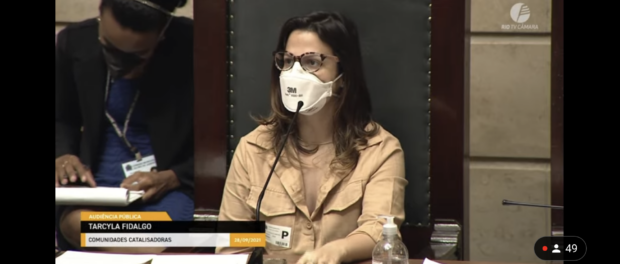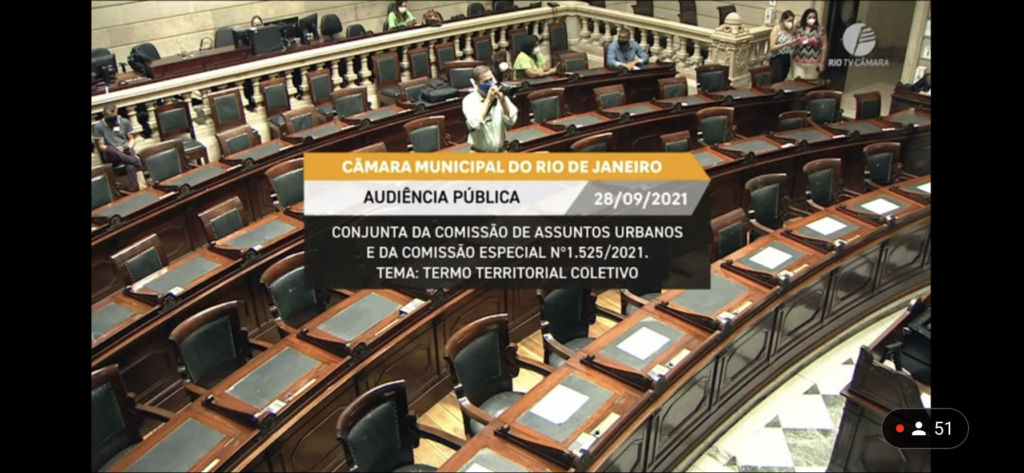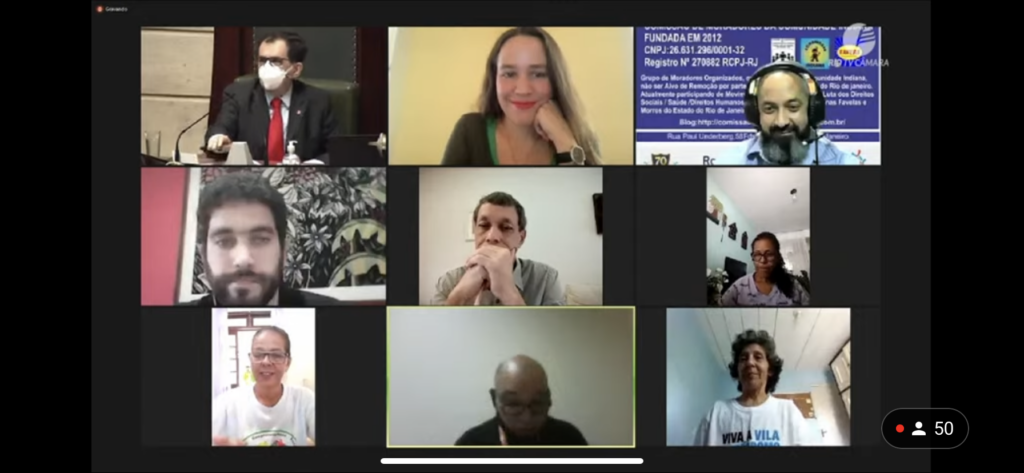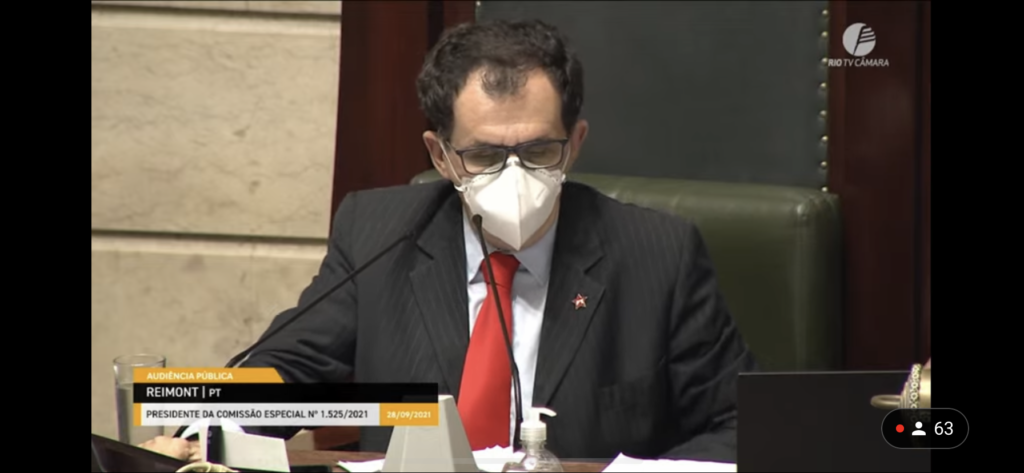
The first Rio de Janeiro City Council hearing on Favela Community Land Trusts was held on September 28, 2021. The event was organized by the Council’s Permanent Commission on Urban Affairs and by its Special Commission on Adequate Housing, in partnership with the Favela Community Land Trust Project—an initiative facilitated by Catalytic Communities (CatComm)*. Residents, community leaders, and representatives from civil society and city government discussed the instrument, which was recently included in the bill that will update the city’s Master Plan (PLC 44/2021, articles 147 to 151), soon to be voted on by the City Council. The event, which took place in a hybrid environment and was broadcast live on the City Council’s YouTube channel and reported on later on its TV channel, began at 10:45am and was presided over by councillor Tainá de Paula, Chair of the Permanent Commission on Urban Affairs, and attended by councillors Reimont, Eliel do Carmo, and Monica Benicio.
After a brief introduction by each councillor present, Tarcyla Fidalgo, Coordinator of the Favela Community Land Trust Project, and Theresa Williamson, Executive Director of Catalytic Communities, presented the instrument. Williamson began her talk by contextualizing the issue of housing, both in Rio and around the world, and highlighted the fact that “at least 20% of the population of any city in the world does not have access to private market-rate housing.” She added that it is up to public authorities or civil society to meet this demand. Williamson also recalled the impacts of Rio’s mega-events on several communities that suffered evictions and gentrification. “From this process, we saw that neither Vila Autódromo‘s concession of use titles, nor the individual private titles granted in some areas of Vidigal guaranteed security of tenure,” said Williamson. It was this scenario that brought forth the search for a more solid alternative, culminating in the proposal for Favela Community Land Trusts.
The Community Land Trust (CLT) originated in the U.S. Civil Rights movement during the 1960s and has since spread the world over, present today in a number of countries and contexts. Through collective land management, the CLT aims to ensure community empowerment, the permanence of residents, and their right to affordable housing in perpetuity.

According to Fidalgo, the CLT has a highly flexible character, which allows it to be adapted to a variety of contexts and to meet local needs, including as a tool to regularize and develop Brazilian favelas. This flexibility is predicated on a model comprised of just a handful of essential features. Core to the CLT model is the separation between the ownership of the land and of the structures that sit on that land. In the CLT model, the land belongs to the community as a whole, while the buildings belong to (or are rented or leased by) residents. The collective ownership of the land is made possible through the establishment and management of a legal entity which is controlled by the community. Moreover, joining the CLT is voluntary, it cannot be imposed on residents, and management of the land must be carried out collectively. Finally, the primary goal is to ensure permanently affordable housing.
Representing Rio’s Urban Planning Secretariat (SMPU) and Planning Commissioner Washington Fajardo, Valéria Hazan explained the process of including the Favela CLT in Rio’s new Master Plan and affirmed that one of the most important aspects of the instrument is the “organization of residents in favor of their common good,” in addition to “rescuing a vision of collectivity that is very necessary for the city.”
Councillor Tainá de Paula then opened the floor to representatives from civil society, universities, and social movements. Ricardo de Mattos, from the Rio de Janeiro State Public Defender’s Land and Housing Nucleus (NUTH), emphasized the benefits of the instrument’s malleability and adaptability, and commented on the CLT’s applicability to the Brazilian context as a tool for informal settlements. “Despite it being very new, the instrument is very promising and it fits the legislation we already have in Brazil, in the federal and other spheres,” he said.
Orlando Santos Junior of the Metropolis Observatory, highlighted the importance of Rio’s protagonism in the incorporation of new urban planning tools, such as the Favela CLT, especially when it comes to an instrument with the potential to respond to major issues faced by the city, such as “land regularization in favelas and precarious settlements, and confronting the parallel power of militias and drug trafficking.” He also pointed out that “Puerto Rico’s pioneering experience shows that this instrument is adequate to promote land regularization, security of tenure, and collective management of popular territories, especially in favelas, besides guaranteeing affordable housing in these territories on a permanent basis.”
Jurema Constâncio, coordinator of Rio de Janeiro’s Union for Popular Housing (UMP-RJ) and a resident of the Shangri-lá popular housing cooperative in Jacarepaguá, mentioned two elements brought by the Favela CLT: security of tenure and the debate on self-management. According to Constâncio, the discussion around the CLT “is not top down, we build it together.” She pointed out that it is exactly this collective construction that will lead to good results. Representing the Rio Archdiocese‘s Favelas Pastoral Committee, Eliane Oliveira also emphasized the importance of the CLT’s community-led process, which ensures that “residents control their way of living, being owners, feeling secure and in control… thus aiming at the defense of residents against this whole process of evictions and threats.”
Aruan Braga of the Favelas Observatory, believes it is very important to understand that “land regularization, access to the right to land, is not conquered with a legal instrument alone.” He stated that “in addition to these legal guarantees, the Favela CLT promotes a process of communication, mobilization, and information in these popular spaces.”
Next, Neide Mattos, a resident of popular housing project Conjunto Esperança in Colônia Juliano Moreira, in Jacarepaguá, talked about her community, which, through a process of self-management and collective action, managed to build adequate housing for 70 families. As for the Favela CLT, Mattos said that it “needs to be implemented here in Rio, in Brazil so that residents can be heard and… be able to experience a sense of security in relation to housing, in relation to their community, so that the community can prosper.” She went on to say that “there is no point in coming up with things that are top down, in which the resident doesn’t participate; things that the resident doesn’t know about, and that they’re not aware of.”
Ailton Lopes of the century-old Trapicheiros favela in Tijuca that is fighting for the regularization of its land, shared why they support the CLT: “We fell in love with the CLT because it is a tool that will truly shield communities, in a protective way, against real estate speculation, both regarding gentrification and forced evictions.” Lopes also believes that the CLT will help communities “get back on their feet, get organized, make the community not only be known as a favela, but as a society—a low-income society, but one that is organized and invested in improving the lives of its residents.”
Representing the Indiana community, Marcello Deodoro recounted the Indiana Residents’ Commission’s first contact with the CLT in 2018: “There, we saw that people have to be listened to, that each one has to be heard. Each resident has something different to offer, each community has its own particularity. In the CLT, we saw ourselves being represented.” In Deodoro’s view, the CLT gives residents a sense of belonging to their community and allows them to be “seen as a single entity, which is not going to be dissolved with one, two, three punches.”
Finally, Maria da Penha Macena, a resident of Vila Autódromo, a community made famous for its fight against Olympic evictions in Barra da Tijuca, gave her testimony about the instrument: “I would like to say that [the CLT] really brings [back] the hope of every community, of every favela, of every informal settlement to be respected, because it is every citizen’s right to be respected in their home, which we built with great difficulty.” Macena explained that the CLT can be implemented in an established community, without the need for relocation, allowing a favela to be improved and for community ties and history to be preserved, which is of utmost importance to residents. She also stated that “land… was not meant to be sold, it was meant to be shared. [But] unfortunately, mankind can’t really understand that.”
Luiz Roberto da Mata, Attorney General of the Municipality of Rio de Janeiro, rounded out the statements speaking about the importance of overcoming “the idea that individual property rights are the gold standard; that collective property must always one day become [individual].” He also mentioned the need to think about new approaches to property that are collective and organized.
Fábio Dutra Costa, from the 200-year-old Horto community, was also present at the hearing and talked about his community’s struggle against real estate speculation and eviction threats. He spoke about the importance of the instrument and said he hopes that, “it will move forward, not only at the city level, but also at the state and federal levels.”
Closing the hearing, councillor Reimont reaffirmed the urgency and importance of the CLT for communities in Rio and in Brazil, and said that the instrument “works with and not for” them, and that it “promotes an issue that is extremely important… which is the issue of critical awareness, of what city we want, what housing we desire; what is it we seek, what is the meaning of our lives.” After the final considerations, the session’s president, councillor Tainá de Paula, thanked everyone for their presence and ended the public hearing.
For more information or to become part of the F-CLT Project, visit the website here.
Watch the Recording of the Public Hearing in Portuguese Here:
Read the Full Transcription of the Event in Portuguese Here.
*Both RioOnWatch and the Favela Community Land Trust (F-CLT) are initiatives of the NGO Catalytic Communities (CatComm).




